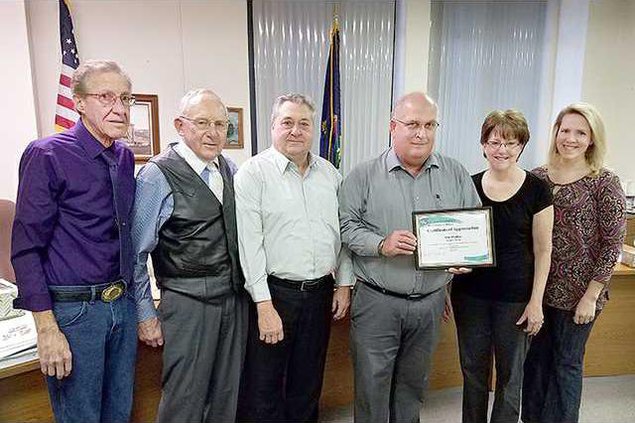Barton County Road and Bridge Director Dale Phillips summed up his 40 years of serving as the county’s noxious weeds director very succinctly.
“It’s been a long time,” he said. “I have great respect for the people I’ve worked with.”
The County Commission Monday morning took time to recognize Phillips for this achievement. He has worked for Barton County since Sept. 11, 1973, becoming the noxious weeds director in 1976.
“We really think this is something that should be celebrated,” Commission Chairwoman Jennifer Schartz said.
“We hope you stick around a little longer,” Commissioner Kenny Schremmer said.
Phillips started with the county as a “patch boy,” filling potholes on county roads. “You have to move up the ladder to prove yourself,” he said.
And move he did. He now oversees not only the Road and Bridge and Noxious Weeds, but also the Memorial Parks department. He also assists Emergency Management Director Amy Miller, and is a retired volunteer fireman for Hoisington and Great Bend after 32 years.
Over the years, he’s served on many state-level boards, such as the Kansas Weed Association, Kansas County Highway Association and the Kansas Association of Counties.
Phillips was honored last week by the KWA for his tenure. Most of the state’s 105 counties have a noxious weeds director and he is the longest-serving such director in Kansas.
In those four decades, Phillips said there have been a lot of changes, but the department has had full cooperation from taxpayers and other officials. In addition, “we are respected across the state.”
“It’s a very viable program,” he said. There have been ups and downs and a growing onslaught of laws and regulations.
Noxious Weeds is an ag-based department, Phillips said. And “Kansas is an agricultural state.”
Whether or not he’s agreed with the new, more restrictive regulations, this continues to be an important function of county government, he said.
The department fights noxious weeds with proper chemical treatments to safeguard crop production and pasture land. Barton County provides noxious weed applications to cities, townships, the state, private landowners and county lands.
Non-noxious weed control includes chemical mowing and bare ground applications for the county as well as brush control measures for townships.
The department is responsible for vegetation/noxious weed control within the county’s borders.
As for what the future holds, “we’ll see how much further it goes.”





